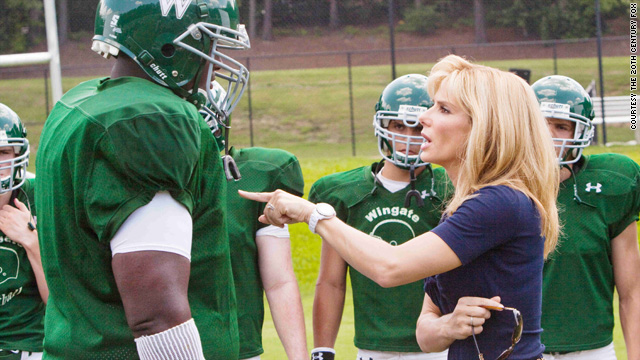Don't take life for granted

Editor's note: Ruben Navarrette Jr. is a member of the San Diego Union-Tribune editorial board, a nationally syndicated columnist and a regular contributor to CNN.com. Read his column here
San Diego, California (CNN) -- Sometimes, a film is so powerful that it haunts you long after you've left the theater. Usually, it's because of the weight of the message.
The film haunting me is "The Blind Side." And the message? I'll leave that to Leigh Anne Tuohy to explain.
Tuohy and her husband, Sean, are the subjects of the new movie, "The Blind Side." The film is an adaptation of the 2006 book, "The Blind Side: Evolution of a Game" by Michael Lewis.
It tells the incredible story of Michael Oher, who went from being a homeless inner-city high school student whose father was dead and whose mother was a crack addict to a star lineman at the University of Mississippi -- eventually being selected by the Baltimore Ravens in the 2009 NFL draft. The Ravens recently signed the 6-5, 309-pound Oher to a 5-year, $13.8 million contract.
This American Dream is brought to us not just by Oher's talent, perseverance, and hard work but also by the fact that he was adopted by the Tuohys. The white, wealthy Memphis family not only fed and clothed Michael but also loved him as one of their own along with daughter Collins and son Sean Jr.
The "Blind Side" is the No. 2 film in America, and the role of Leigh Anne Tuohy is played to perfection by Sandra Bullock.
Still, some critics dismissed the film as hokey and condescending, with one calling it the latest chapter in Hollywood's "long, troubled history of well-meaning white paternalism, with poor black athletes finding success through white charity."
They missed the point. Simply put, there's a lot that any one of us can do to improve the life of our fellow man. And the fact that we do it is its own reward.
"He had a much greater impact on our lives than we did on his life," Leigh Anne said in a recent interview. "You have this child, and you bring him in, and you realize how fortunate you are, how you're blessed to have family, you're blessed to have your health. So much in life you take for granted."
There's the message: So much in life you take for granted. We've forgotten how lucky we are, because we're busy cursing fate. We've stopped being grateful for what we have, because we somehow find it more satisfying to complain about what we don't. Until we meet someone who has much less than we do.
So much in life you take for granted.
As Americans, we've become victims of our own success. We've strayed so far from the example of our immigrant parents and grandparents that we bear no resemblance to that model.
Weighed down by own bloated sense of entitlement and self-importance, we've lost our appetite for competition and we prefer to talk instead about what we think we "deserve." At the first sign of adversity, we play the victim, give up, or fall apart. With all the blessings that come with living in the world's most remarkable country, still we complain. We retreat. We whine.
Here in the Golden State, thousands of students at the University of California turned out to protest a 32 percent fee increase. I wrote a column, expressing disappointment that these "brats" consider a publicized subsidized college education an entitlement and telling them to go get jobs if their education is that important to them. I heard back from many of their parents who, angrily rising to their children's defense, informed me -- in incompatible narratives -- that either there were no jobs or their kids already had two of them.
How about that? Bratty parents. Apparently, in California, the apple doesn't fall far from the tree.
After a few days of that noise, I was ready for a movie where, in one of the more poignant scenes, a young man is given his own bedroom and remarks that he's "never had one before." Not a room but a bed.
In another scene, Michael is so grateful to be at Thanksgiving dinner that he respectfully sits at the dining room table while the rest of the family plops down in front of the television. In another scene, he requests a driver's license just so he can have something with his name on it.
So much in life we take for granted.
I saw the movie in a well-to-do suburb north of San Diego. The crowd cheered, laughed, and cried. When it was over, there were smiles all around. I wondered: For all we've acquired, what have we lost -- and look to movies like this to replenish?
The scene about the bed made me want to run home and gather up every one of my kids' toys and give them to Goodwill. And, I tell you, the next time they ask for something they don't need, they're getting a paper route. Or at least they would if they weren't a preschooler and a toddler.
In one scene, Leigh Anne interrupts football practice to give Michael a helpful tip for a lineman -- treat the team like your family and protect the family. She tells the startled football coach: "You can thank me later."
Treat yourself to a nice present this holiday season. See this movie. You can thank me later.
The opinions expressed by this commentary are solely those of Ruben Navarrette Jr.
No comments:
Post a Comment